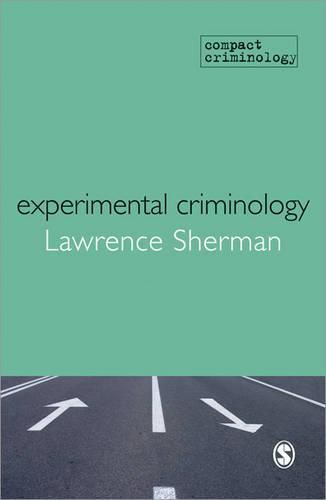Readings Newsletter
Become a Readings Member to make your shopping experience even easier.
Sign in or sign up for free!
You’re not far away from qualifying for FREE standard shipping within Australia
You’ve qualified for FREE standard shipping within Australia
The cart is loading…






For a 6-minute video in which Lawrence Sherman describes a new experiment in policing click here As the 21st Century becomes the era of evidence-based policy, the role of experimental evidence has become more important than ever. It is also critical to improve the quality of field experiments in crime and justice, more of which are now conducted each year than ever before. This book is the indispensable introduction to reading, understanding, evaluating, using and doing randomized field experiments in and around the criminal justice system, including: policing; bail and pre-trial processes; prosecution; sentencing; probation; prison; administration; parole and re-entry; family-based crime prevention; community-based crime prevention; and, private security. Using case studies of both successful and unsuccessful experiments, this book shows novices and senior scholars alike how experiments can be done better, analyzed better, and put to better use for evidence-based crime policy. It also shows how experiments can be combined in systematic reviews of evidence, which make the most of their potential to predict the best results from any policy decision. Designed for use in both graduate and undergraduate research methods courses in criminology, criminal justice, sociology, community psychology, education and public health, the book is also designed for mid-career government and business executives in crime prevention and justice policy. Lawrence W. Sherman has designed and directed over 25 randomized field experiments in policing, prosecution, probation and private security. The founder of the Academy of Experimental Criminology and Chair of the Division of Experimental Criminology of the American Society of Criminology, he has received the Beccaria Medal from the Society of Criminology of German-Speaking Nations, the Sutherland Prize of the American Society of Criminology, the McCord Prize of the Academy of Experimental Criminology, and other awards for distinguished scholarship from the American Sociological Association, the American Academy of Political and Social Science, and the Academy of Criminal Justice Sciences. He is the most highly-cited police scholar in English-language research journals, and is Director of the Police Executive Programme at Cambridge University, where he also directs the Jerry Lee Centre for Experimental Criminology.
$9.00 standard shipping within Australia
FREE standard shipping within Australia for orders over $100.00
Express & International shipping calculated at checkout
For a 6-minute video in which Lawrence Sherman describes a new experiment in policing click here As the 21st Century becomes the era of evidence-based policy, the role of experimental evidence has become more important than ever. It is also critical to improve the quality of field experiments in crime and justice, more of which are now conducted each year than ever before. This book is the indispensable introduction to reading, understanding, evaluating, using and doing randomized field experiments in and around the criminal justice system, including: policing; bail and pre-trial processes; prosecution; sentencing; probation; prison; administration; parole and re-entry; family-based crime prevention; community-based crime prevention; and, private security. Using case studies of both successful and unsuccessful experiments, this book shows novices and senior scholars alike how experiments can be done better, analyzed better, and put to better use for evidence-based crime policy. It also shows how experiments can be combined in systematic reviews of evidence, which make the most of their potential to predict the best results from any policy decision. Designed for use in both graduate and undergraduate research methods courses in criminology, criminal justice, sociology, community psychology, education and public health, the book is also designed for mid-career government and business executives in crime prevention and justice policy. Lawrence W. Sherman has designed and directed over 25 randomized field experiments in policing, prosecution, probation and private security. The founder of the Academy of Experimental Criminology and Chair of the Division of Experimental Criminology of the American Society of Criminology, he has received the Beccaria Medal from the Society of Criminology of German-Speaking Nations, the Sutherland Prize of the American Society of Criminology, the McCord Prize of the Academy of Experimental Criminology, and other awards for distinguished scholarship from the American Sociological Association, the American Academy of Political and Social Science, and the Academy of Criminal Justice Sciences. He is the most highly-cited police scholar in English-language research journals, and is Director of the Police Executive Programme at Cambridge University, where he also directs the Jerry Lee Centre for Experimental Criminology.